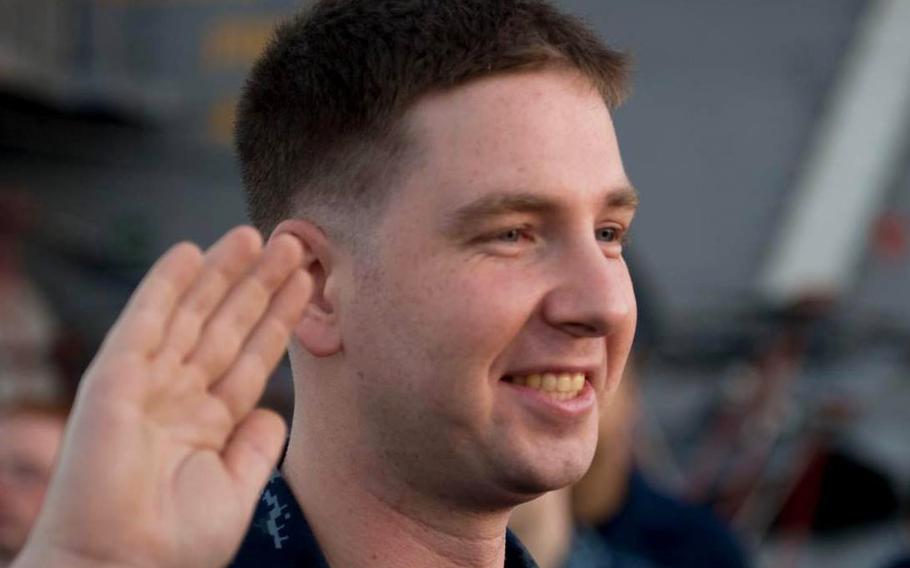
Petty Officer 2nd Class Dmitry Chepusov, a military broadcaster, was found strangled to death in the passenger seat of a car during a traffic stop in December 2013. Two American servicemembers have been charged in connection with his death. (Facebook photo)
RAMSTEIN AIR BASE, Germany — American and German autopsies came to the same conclusion about the death of Dmitry Chepusov, the American sailor whose body was found in an automobile during a traffic stop in Kaiserslautern, Germany, in December 2013: He was strangled.
Dr. Matthias Kettner, a German forensic pathologist, and Dr. Dori Franco, an Army major and the military’s regional medical examiner for Europe, both testified this week at the court-martial of the airman charged in Chepusov’s death. They agreed that the sailor was likely manually strangled, meaning somebody used his hands to choke him to death.
Kettner, who said he has done between 1,500 and 2,000 autopsies in his career, said nothing he found contradicted or was inconsistent with that finding.
Franco, who conducted the second autopsy on Chepusov, said her findings essentially mirrored Kettner’s, though she didn’t have access to his report when she conducted her own examination.
Kettner removed tissue from Chepusov’s neck that German authorities held on to for nine months before turning it over to Air Force investigators. Franco said she got to examine that neck tissue in September.
She said after examining the tissue, which included cartilage, a small neck bone and other organs, she changed the conclusion of her autopsy from injuries to the head and neck “consistent with strangulation” to a simpler finding of “strangulation.”
Staff Sgt. Sean Oliver’s defense questioned both examiners about the possibility that Chepusov might have died from a carotid sinus reflex, a reaction in which the heart stops in response to grabbing the neck.
Kettner and Franco both said they couldn’t rule it out. Kettner said there are no studies of the reflex, since inducing it stops the heart and could kill potential test subjects, and that its existence is largely theoretical.
However, Kettner said, citing the medical literature on the reflex, that it results from a momentary grabbing of the neck. Chepusov’s injuries, which include damage to every neck muscle from the front of the neck to the spine, as well as fractures to cartilage and a bone in the throat, appear to be the result of significant force over a period of time, both pathologists testifed.
How long he was strangled, neither Franco nor Kettner could say.
Kettner said there’s evidence in medical literature that suggests someone could die from strangulation in as little as a minute, but it can take much longer. Strangulation typically leads to unconsciousness in 10 to 15 seconds, Franco said. Kettner said strangulation generally takes longer when the victim is fighting back. Injuries to Chepusov’s arms and wrists were indicative of defensive wounds, both pathologists testified.
Prosecutors, who have charged Oliver with premeditated murder, have alleged that he continued to choke Chepusov long after he lost consciousness in order to kill him.
Oliver, in a statement to Air Force investigators in December 2013, said that he choked Chepusov to knock him out after he became belligerent, but not to kill him.
Oliver was pulled over with Chepusov’s body in the passenger seat of his car early in the morning of Dec. 14, 2013.
A paramedic who arrived on the scene testified Tuesday that medical personnel tried to get a tube down Chepusov’s throat in order to perform rescue breathing, but they were unable to get his mouth open.
Paramedic Frank Diekberdel said he didn’t know why the mouth wouldn’t open, but “mechanically, it was just not possible.”
Franco and Kettner both testified it was possible that was a sign of rigor mortis. The jaw is one of the first muscles to freeze up, Kettner said.
But knowing that doesn’t necessarily provide any insight into exactly when Chepusov died, both Kettner and Franco said.
millham.matthew@stripes.com Twitter: @mattmillham